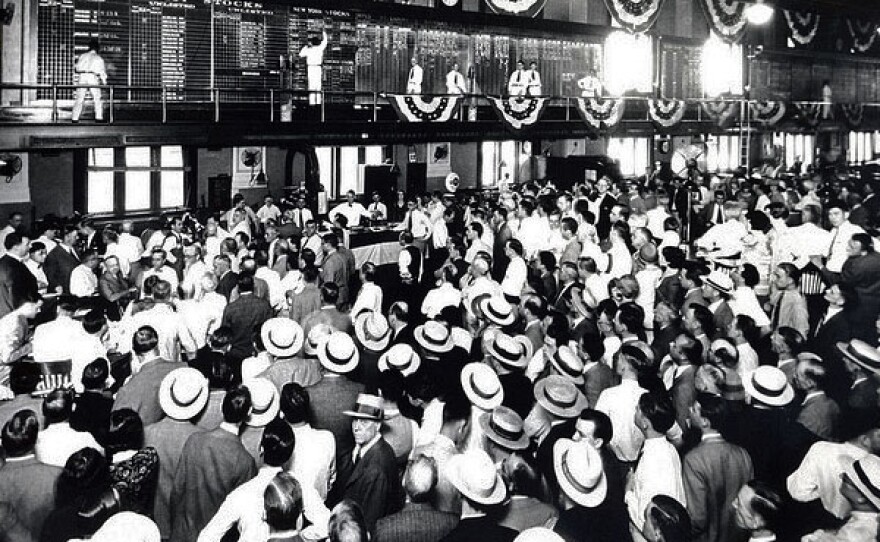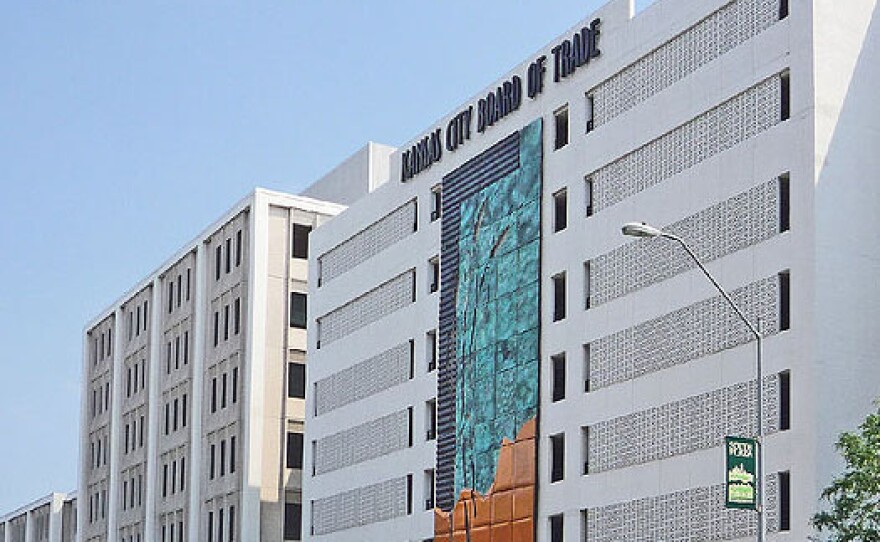For 157 years, the price of most wheat grown on the plains has been set by the Kansas City Board of Trade. That will soon come to an end.
In October 2012, Chicago-based CME Group acquired the Kansas City Board of Trade. Operations move to Chicago as of July 1 – and the last call on the Kansas City trading floor takes place on Friday. Here's a look back at the long history of the Board of Trade – and the end of an era.
Deep roots in KC
The board got its start in the 1850s when local merchants met to try to create a more organized way to buy and sell grain. By 1876, and the first grain call, trading in commodity futures began. Seats at the board could be purchased – and this would give a member the rights to trade at the exchange.
From 1925 through 1966, the Board of Trade was based in a 13-story brick and limestone building at 10th and Wyandotte, according to Heather Paxton, who has written several books about Kansas City history. Today, the building is filled with condos.
When it was built, Paxton said, it was considered the largest grain exchange in the world. She lists a "Who's Who" of Kansas City families with generations of membership, names like Theis, Vanderslice, Uhlmann, Kemper, and Sosland.
"I think Kansas City is very sorry to see it go, and I know I am," Paxton said. "Not just because of the tradition of it, but because of all the people who worked there, and how much they loved it and how many people stayed for decades."
Michael Braude ran the exchange from 1984 to 2001.
"I was always proud of the place," Braude said. "I always said that I had three loves in my life: my family, the Board of Trade and the Missouri Tigers, and I’m down now to two."
Busloads of schoolchildren and overseas customers on trade visits would tour the Board of Trade. Braude said he’d often bring visitors to observe the trading floor – a cluster of traders, signaling with their hands, shouting bids. As he describes it, the floor was where “more money changed hands than anywhere in Kansas City.
"And on a good day, they’d look down in the wheat pit and there would be 60 or 70 traders there. With open outcry, there was a lot of yelling. It was a great visual thing to watch. And to listen to," he said.
Silencing of the open outcry
Paxton said open outcry was an odd and wonderful thing.
"There was a description from 1945 from a journalist who came to the Board of Trade and he talked about seeing grain samples lying around and the fact that the traders were in the pit and he said, 'yelling as if a panther were at them,'" she said.
But in recent years, this open outcry has mostly been silenced. It’s estimated that now nearly 90 percent of Kansas City’s hard red winter wheat contracts are processed by computers.
"I don’t want to be callous, but technology has obviated the need for a physical exchange facility," said Harold Bradley who started an investment career in the early 1980s as a floor trader at the Board of Trade. Bradley went on to work at American Century, and then the Ewing Marion Kauffman Foundation (he retired as CIO in 2012).
Bradley said he wasn’t surprised when Chicago’s CME Group, which also owns the Chicago and New York Mercantile Exchanges and the Chicago Board of Trade, bought Kansas City’s exchange for $126 million.
"Money moves electronically," Bradley said. "And I can reach you immediately, if I’m a buyer of May wheat, and you’re a seller of May wheat, I don’t need to send an order to a stinking floor: your order is on a number of electronic venues and it trades out.
"So what that means is you have massive excess infrastructure. That used to serve the trading. It’s not that it was never important – it was vital, vital! But now, it’s expensive real estate."
The Board of Trade’s real estate, the building at 48th and Main, is up for sale with the acquisition by CME.
A long history in storage
David Boutros is the assistant director of the State Historical Society of Missouri Research Center-Kansas City. With upturned eyebrows, glasses, and a white beard, he sits at a dark wood table on the third floor of a limestone building on the University of Missouri-Kansas City campus.
"We are the keepers of Kansas City history – along with a number of other institutions," he said.
Boutros said the society acquired the Board of Trade records in 1981 – it’s close to 300 cubic feet, about 150 file drawers. This includes minutes of the board going back to the earliest years, handwritten, and beautifully scripted.
As the Kansas City Board of Trade closes, more of the records are expected to arrive here. But Boutros said it’s not like when an artist dies and the value of the work gets a boost. It's possible no one may request the records - for historical or personal use - for 10, 20, or even more years.
"Sometimes though, and this might sound funny, we save things simply because they need to be saved," Boutros said. "We anticipate uses, but we also know that in order to ensure that sometime in the future for those questions to be answered, we save those materials."
What’s also being saved is the name “Kansas City” in the hard red winter wheat contract. But, after more than a century, the trading of it will now take place in another city: Chicago.













